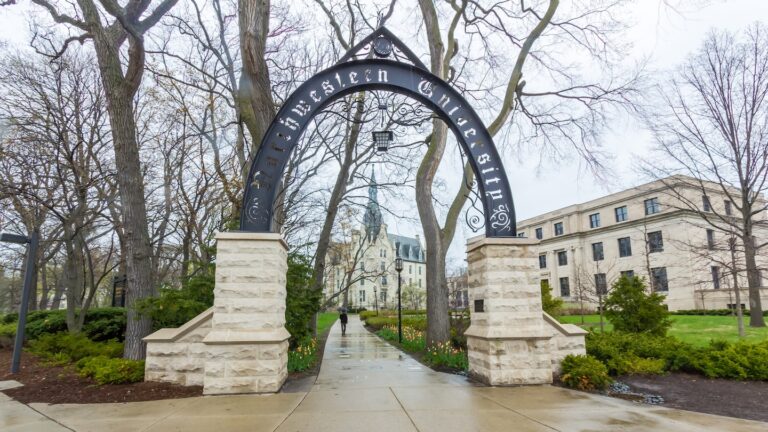The complaint alleges that racial and gender preferences at Northwestern Law School are widespread and constitute pervasive discrimination against more qualified white men.
“For decades, left-wing professors and administrators have flouted federal anti-discrimination laws,” according to the complaint filed Tuesday in Illinois federal court. “They do so by hiring women and racial minorities with poor records and without distinction instead of white men who have better qualifications, greater scholarship and better teaching abilities.”
Jonathan Mitchell, a The prominent lawyer behind the lawsuit has vowed to challenge similar practices at other universities and has invited those with “incriminating evidence” to contact him.
Northwestern University spokesman Jon Yates said the university would dispute the allegations, though he declined to respond to the specific accusations.
“Northwestern Pritzker School of Law is one of the top law schools in the country, and we are proud of their exceptional faculty,” Yates said in a statement. “We intend to vigorously defend this case.”
Former law school dean Daniel Rodriguez, one of the defendants named in the complaint, declined to comment. Others named in the complaint did not immediately respond to requests for comment.
Paul Gowder, one of the black law professors named in the lawsuit as an example of someone who benefited from racial preferences, strongly rejected the allegations.
“This is pure racism,” he said in an interview, noting that he was speaking for himself and not the law school or the university. “My record speaks for itself. I would compare it to anyone who was rejected.”
The case comes amid widespread conservative resistance to efforts to ensure that American institutions of all kinds reflect the country’s racial and ethnic makeup. Liberal advocates argue that generations of discrimination have given unfair advantages to white men, and the killing of George Floyd in 2020 has added urgency to efforts to right past wrongs. But others argue that these efforts have gone too far and are harmful and unfair, and are challenging them with legislation and lawsuits.
The lawsuit filed Tuesday was filed on the 60th anniversary of President Lyndon B. Johnson signing the landmark Civil Rights Act of 1964, which prohibits discrimination based on race, color, religion, sex or national origin. Mitchell said the timing of the lawsuit was coincidental.
The new lawsuit follows Supreme Court decisions a year ago to strike down race-based admissions at Harvard University and the University of North Carolina at Chapel Hill, rulings that upended decades of work by elite schools to mitigate historical discrimination and create more diverse student bodies. Those decisions focused on the admissions process and did not directly address race in recruiting, but many academics said at the time that the court had opened the door to a challenge like the one filed Tuesday.
The court’s decision in the college admissions cases also prompted universities across the country to take a closer look at how race is used as a factor in admissions and other matters. It also sparked a wave of lawsuits against programs designed to diversify public and private institutions, including lawsuits against companies alleging discrimination against white people.
The lawsuit filed Tuesday targets Northwestern, a highly selective private university near Chicago, which accuses its law school of seeking for more than a decade to recruit as many nonwhite and nonmale faculty members as possible, leading the school to choose less qualified candidates over more qualified white men. The lawsuit names three white men it says were passed over despite having strong credentials, as well as four black women and one black man who were allegedly offered faculty positions because of their race and/or gender, painting several of the scholars in highly unflattering terms.
The complaint names Northwestern as defendants, along with its law school dean, a former dean, two other law professors and two editors of the Northwestern University Law Review. It claims the university’s law journal uses illegal racial and gender bias to select its members, editors and articles, rather than choosing based on merit.
It includes calls for changes to school policies and practices and the creation of a judicial monitor to oversee faculty hiring, promotion and compensation, legal review decisions and the university’s diversity offices.
The group also sent letters to more than 100 universities on Tuesday, warning them that the plaintiffs group intends to sue other schools that deploy “these illegal and discriminatory practices,” and warning anyone currently or formerly affiliated with the university to preserve records and communications related to faculty hiring issues and legal review decisions.
“We’re just getting started,” said Mitchell, the plaintiffs’ lawyer who has argued numerous cases before the Supreme Court, clerked for the late Justice Antonin Scalia and successfully represented former President Donald Trump in a case to keep him on the ballot in Colorado this year. He also won a major victory last month when the Supreme Court struck down a ban on bump stocks for semi-automatic weapons.
The complaint includes anonymous plaintiffs who Mitchell said could apply for jobs at any number of universities, giving them the right to sue “any university they choose.” None of the professors named in the complaint were aware of the lawsuit or played any role in providing information, he said.
“All universities do it,” he added.
Some legal experts have questioned the case’s prospects. Noah Feldman, a Harvard law professor, noted that there is already a legal remedy for claims of hiring discrimination: Title VII of the Civil Rights Act, which prohibits hiring discrimination based on race. This case was brought under the law, which prohibits universities from discriminating on race in general.
He also questioned whether the plaintiffs would be able to demonstrate that they have the right to sue.
“You have to prove actual harm to have standing under the Constitution, and I have trouble seeing how they intend to demonstrate that harm,” he said.


